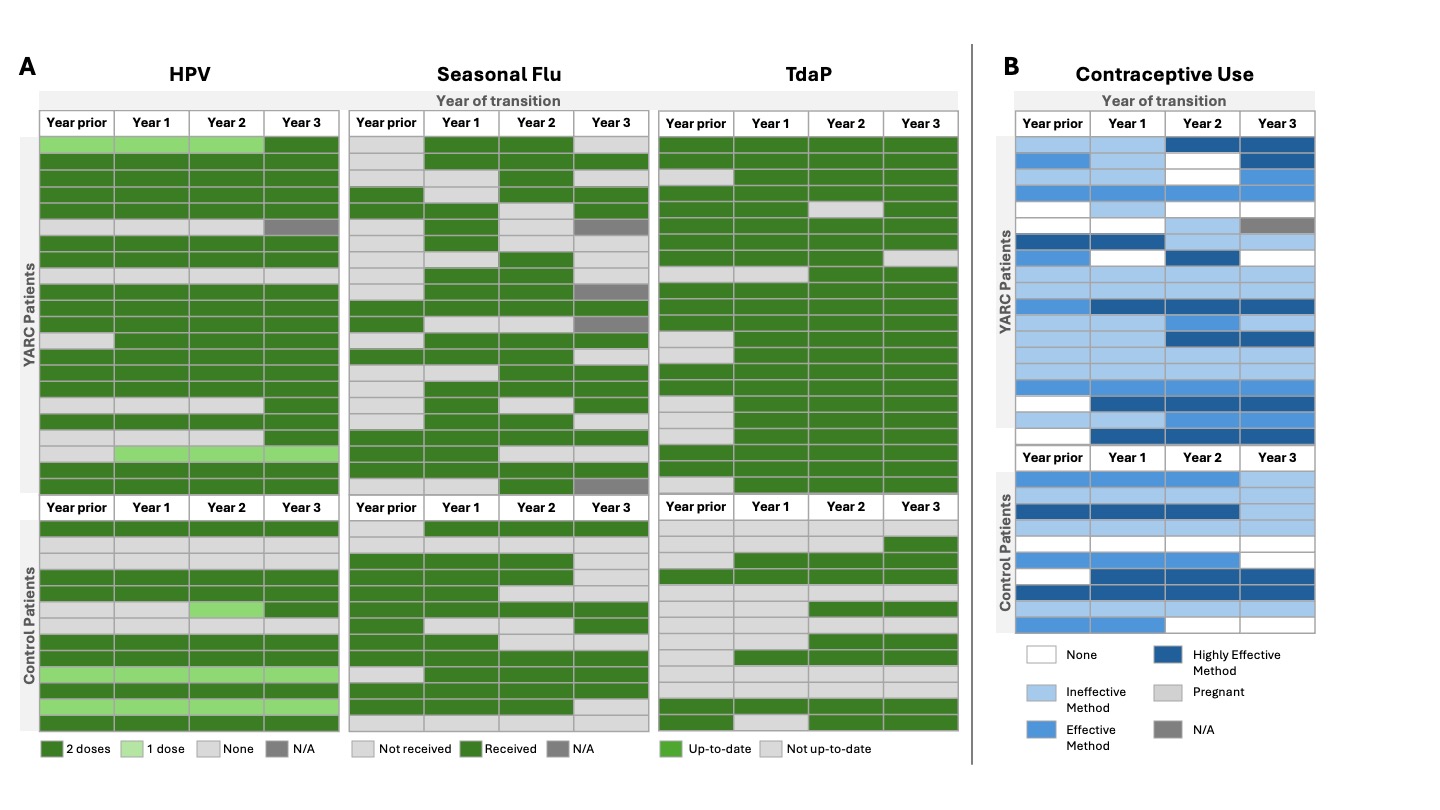Session Information
Session Type: Poster Session C
Session Time: 10:30AM-12:30PM
Background/Purpose: The transition from pediatric to adult care can pose a challenge for patients with SLE and other rheumatic diseases. These patients often face preventable disease flares, unintended pregnancies, depression, anxiety, and other complications. The Young Adult Rheumatology Clinic (YARC) was established in 2020. Based on the medical home model, the YARC provides integrated primary care and social work to young adults with pediatric-onset rheumatic diseases. This study investigated the impact of the multidisciplinary, transition-focused YARC for the care of recently transferred patients.
Methods: We generated descriptive statistics for YARC patients and control patients who transferred without enrolling in the YARC. Over the three years following transfer, we tracked immunizations, contraception, and unintended pregnancy among YARC and control patients. We also looked for changes in inpatient admissions, ED visits, and rheumatology show/cancellation rates, comparing patients in their third year after transfer to themselves before transfer. To identify the YARC’s strengths and areas for improvement, we administered a post-clinic survey and conducted interviews.
Results: YARC (n=22) and control (n=13) patients who transitioned to adult care between July 2017 and October 2023 were included. Age, race, and ethnicity were similar between groups. Most (59%) YARC patients had SLE, as did all control patients (Table 1).YARC patients attended 61% of scheduled visits prior to transition and 71% after transition. No-show rate decreased from 13% to 10% and cancellation rate fell from 26% to 19%. ED visits were similar before and after transition, but hospitalizations decreased from 0.4 to 0.2 per patient per year (Table 2). Use of highly effective contraception (implant or intrauterine device) among YARC patients increased from 5% to 33% but was unchanged in the control group (20%) (Figure 1). There were two unintended pregnancies after transition to the YARC and four unintended pregnancies in the control group. More YARC patients were up to date on TDaP (96% vs. 62%, p=0.02) and had received at least two doses of HPV vaccine (91% vs. 62%, p=0.08). Flu vaccine uptake was similar between YARC and controls (Figure 1). In surveys and interviews, patients said the most useful aspect of the clinic was having a “one stop shop.” Many also said that they appreciated a non-judgmental attitude and respect from YARC providers. However, multiple patients thought the facility was outdated; other pain points were travel times to and wait times at the clinic.
Conclusion: We saw promising signs that multidisciplinary, coordinated management of the pediatric-to-adult transition can improve clinical and economic outcomes for young adults with rheumatic disease, though conclusions are limited by sample size and availability of control data. YARC patients had improved pregnancy prevention and immunization rates compared to SLE patients who did not attend a transition clinic. Overall utilization also improved among YARC patients, despite literature suggesting that hospitalizations typically increase following transfer. Thus, the YARC model may reduce unnecessary healthcare utilization while maintaining rheumatology continuity.
 Figure 1. Vaccination status (A) and contraception use (B) among YARC patients and control young adult SLE patients
Figure 1. Vaccination status (A) and contraception use (B) among YARC patients and control young adult SLE patients
Contraception use is shown only for female patients. “N/A” indicates lack of data for year 3 due to later transfer of care in some YARC patients.
.jpg) Table 1. Subject demographics and characteristics at time of transition from pediatrics to adult care
Table 1. Subject demographics and characteristics at time of transition from pediatrics to adult care
Values presented as n (%) unless otherwise indicated. *Other diagnoses include UCTD (n=1), and Behcet’s disease (n=1); **positive screen defined as a score of 3 or higher on PHQ-2/GAD-2 or 10 or higher on PHQ-9/GAD-7 on earliest available post-transition questionnaire.
.jpg) Table 2. Rheumatology visit attendance and high-cost healthcare utilization among YARC patients before and after transfer of care
Table 2. Rheumatology visit attendance and high-cost healthcare utilization among YARC patients before and after transfer of care
To cite this abstract in AMA style:
Concannon H, Oesch J, Mazzarelli S, Fields A, O'Garo K, Sadun R. Multidisciplinary Rheumatology Transition Clinic for Young Adults Shows Improved Experience, Utilization, and Health Maintenance: A Mixed-Methods Evaluation [abstract]. Arthritis Rheumatol. 2025; 77 (suppl 9). https://acrabstracts.org/abstract/multidisciplinary-rheumatology-transition-clinic-for-young-adults-shows-improved-experience-utilization-and-health-maintenance-a-mixed-methods-evaluation/. Accessed .« Back to ACR Convergence 2025
ACR Meeting Abstracts - https://acrabstracts.org/abstract/multidisciplinary-rheumatology-transition-clinic-for-young-adults-shows-improved-experience-utilization-and-health-maintenance-a-mixed-methods-evaluation/
